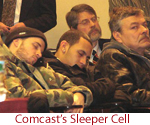Your Votes Are In: A Look Back on 2008’s Top Online Law Posts
A quick look at our log shows which stories visitors viewed most in 2008 on Useful Arts. I had forgotten how important, and frequently bizarre, this year’s topics were.
Three posts towered above the others: CAN-SPAM, teens behaving badly online, and Tiffany’s contributory infringement case against eBay.
January:
Catherine Douglas started the year off with visionary comments at Thomson CompuMark’s trademark law forum.
“15 years ago, law schools gave trademark law only passing reference. Since then, its become a specialty. Why? Because during those years, companies have come to differentiate themselves based on their brands.”
I spoke during a massive blackout in Miami at Marketing Sherpa’s B2B conference. Imagine the magical and scary sight of marketers singing Kumbaya to the light of laptops.
February:

Anger at Comcast heated up as they packed a public hearing with paid sleepers.
Concern rose about President Bush’s gutting of a key privacy board, and interest increased as Lawrence Lessig explored a possible congressional run.
March:
Social networking and virtual worlds gained attention for their use by social activists, and I wrote guides to federal CAN-SPAM regulations and state CAN-SPAM “side orders.” Blogging from the Virtual Law Conference was a blast this year, and resulted in a long article on law in virtual worlds.
April:
Poorly parented teens beat a cheerleader and posted the video online. Brandon Lovested discovered that a chip in your tire’s valve stem may be reporting on your driving.
May:
A post using intellectual property records to track competitors’ activities was the month’s top new post. And Boing Boing brilliantly mocked site-use policies that prohibit linking.
June:
I poked fun at the Presidential campaigns’ use of Twitter as a method of debate, and ridiculed Edmund Chung’s suggestion that the Internet would be improved if it had been invented in China.
 There was also humble pie to be eaten by a defendant who claimed he innocently used a product called “evidence eliminator” and by a judge who had to call on the Supreme Court Chief Justice to review his own pornographic joke collection.
There was also humble pie to be eaten by a defendant who claimed he innocently used a product called “evidence eliminator” and by a judge who had to call on the Supreme Court Chief Justice to review his own pornographic joke collection.
July:
eBay won a decisive victory over Tiffany. A “maniacal” network engineer held San Francisco’s network hostage. I spoke about Lay Epistemology at PodCamp, and when I spoke at the OMS conference in Boston, an audience member summed up the use of video on the web perfectly: “Reading is for suckers” (a quote I’ve used weekly since then).
August:

Is Obama the Anti-Christ became one of Google’s most frequent campaign-related searches. Copyright propaganda turned up in several comic books published by judges, and Disney. And even in my memory, August’s foolishness eclipses the revelation that The US “Cyber Command” is in shambles, leaving America unable to defend against organized cyber attacks. Guess we should address this in 2009. ;>
September:

Best trademark abuse ever: police in China borrow Microsoft’s IE browser logo. I spoke about online branding and CMS best practices at ExactTarget’s user meeting, and moderated a webinar on Tiffany v. eBay.
October:
Presidential pumpkin politics – supporters of both candidates carve pumpkins which resemble their picks.
November:
Lori Drew is found guilty of being a hacker for breaking MySpace’s terms of use. ICANN hosts a forum where legal staff for big brands call ICANN’s new top-level domain policy a train wreck in the making fueled by greed.
December:
 Thoughts on Brand Obama. Ten laws on building a SaaS company. A school claimed exclusive copyright on its students works. There’s crime on Criagslist, layoffs at Google, and recording industry sales nose-dived even as it considered ending prosecution of file sharers.
Thoughts on Brand Obama. Ten laws on building a SaaS company. A school claimed exclusive copyright on its students works. There’s crime on Criagslist, layoffs at Google, and recording industry sales nose-dived even as it considered ending prosecution of file sharers.
Do IP law stories ever actually conclude? Probably not. They get appealed, become precedents, get overturned, or perhaps they are picked apart forever by the likes of you and me.
So, here’s to your health. Happy New Year! Whatever happens next in online marketing and law, we’ll sort it out here in 2009.

 The future of digital experiences will be built by strategists who grasp the full array of emerging business, social, and technical models. Specialties in user experience, branding, application design, and data science are laying the foundation for richer user experiences and business models breakthrough products and revenue based marketing.
The future of digital experiences will be built by strategists who grasp the full array of emerging business, social, and technical models. Specialties in user experience, branding, application design, and data science are laying the foundation for richer user experiences and business models breakthrough products and revenue based marketing.
Comments are closed.